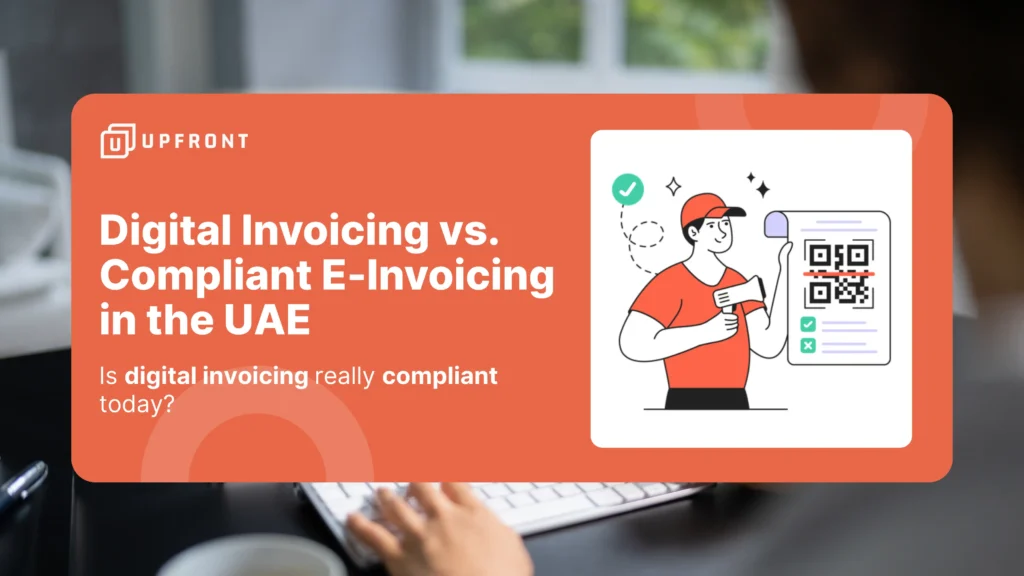Is digital invoicing really compliant today?
In the fast-evolving business landscape of the UAE, keeping up with the latest invoicing requirements is essential for staying compliant with the Federal Tax Authority (FTA). As FTA e-invoicing regulations enter Phase 2, businesses are facing the critical decision of understanding the difference between digital invoicing and compliant e-invoicing. The distinction between these two invoicing methods is vital for businesses looking to streamline operations while staying compliant with VAT regulations.
This article will help you navigate the complexities of FTA-compliant invoicing, highlighting the essential differences between digital invoicing and e-invoicing. Additionally, we’ll explain why e-invoicing compliance matters and how businesses can effectively prepare for the upcoming changes.
What Is Digital Invoicing?
Digital invoicing refers to any method where invoices are created, sent, and received electronically instead of using paper. Digital invoicing is a major step towards reducing paper-based processes, but it doesn’t necessarily comply with the legal and technical standards set by the FTA for VAT compliance. Common digital invoicing practices include:
- Attaching PDF invoices to emails.
- Using basic accounting software that generates invoices in PDF format and sends them via email or through online portals.
- Leveraging AR automation tools like Upfront, which can automatically generate and send invoices electronically.
While digital invoicing offers significant efficiency gains (speed, cost savings, and professional presentation), it lacks the standardized format required for automation and government validation. The FTA-compliant e-invoicing system goes beyond this simple electronic delivery method to ensure data integrity and compliance.
Benefits of Digital Invoicing:
- Speed: Invoices are instantly delivered to your clients, eliminating delays associated with traditional paper-based invoicing.
- Cost Savings: No need for paper, printing, postage, or filing cabinets.
- Professional Presentation: Digital invoices present a modern, professional look for your business.
- Ease of Access: Digital invoices are easy to store and retrieve, reducing the risk of losing critical documents.
What Is Compliant E-Invoicing in the UAE?
Compliant e-invoicing is an advanced method of invoicing where the invoice data is structured in machine-readable formats such as XML or UBL. These structured formats are specifically designed to be processed by machines, enabling automated processing from the supplier to the buyer’s system. This structured data format is crucial for meeting the regulatory requirements set by the FTA under UAE VAT laws.
Key characteristics of FTA-compliant e-invoicing:
- Structured Data Format: Invoices are exchanged in a machine-readable format (like XML or UBL) that includes comprehensive data such as tax details, line items, and customer information.
- System-to-System Communication: E-invoices are automatically transmitted from one system to another, reducing the need for manual input or optical character recognition (OCR).
- Direct Link to the FTA: In many cases, e-invoices will be linked to the FTA for validation, ensuring that each invoice is legitimate and compliant.
- Digital Signature: As part of Phase 2 of the e-invoicing regulations, a digital signature is mandatory to confirm the authenticity of each invoice.
While the UAE has not yet mandated full-scale B2B e-invoicing across all businesses (as of early 2025), the regulatory landscape is shifting rapidly, and adopting compliant e-invoicing now will prepare your business for future mandates.
Key Differences Between Digital Invoicing and E-Invoicing
| Feature | Digital Invoice | FTA-Compliant E-Invoice |
|---|---|---|
| Invoice Format | Often human-readable (PDF, Word) | Machine-readable (XML, UBL) |
| Sending Method | Email/manual | System-to-system |
| Legal Status | May not comply | Fully compliant with VAT law |
| Signature | Optional | Mandatory digital signature |
Why Compliance Matters: Penalties & Legal Risks
FTA-compliant invoicing is not just a matter of efficiency — it’s critical for staying compliant with the UAE’s VAT regulations. The government has put in place strict measures to ensure businesses adhere to invoicing standards, and failure to comply can lead to significant legal and financial repercussions.
Penalties for non-compliance can include:
- Administrative fines: If your invoices aren’t FTA-compliant, you may face penalties for failure to adhere to VAT laws.
- Delays in VAT refunds: Non-compliant invoices could delay VAT refunds, impacting your cash flow.
- Audit complications: Failing to use the proper invoice formats or lack of structured data can complicate audits and result in penalties.
By adopting compliant e-invoicing now, businesses can avoid penalties, simplify their invoicing processes, and ensure faster VAT refunds.
How to Become E-Invoicing Compliant in the UAE
Becoming compliant with FTA e-invoicing involves several steps. Here’s how to prepare for the changes:
- Register with the FTA: Ensure your business is registered with the Federal Tax Authority for VAT purposes.
- Use Certified E-Invoicing Platforms: Implement FTA-approved e-invoicing platforms like UPFRONT, Zoho, or SAP that generate invoices in the required structured format (XML, UBL).
- API Integration: Set up API integrations between your invoicing system and accounting platforms to automate invoice submission.
- Digital Signature: As part of Phase 2, ensure that all your e-invoices are signed digitally for added security and compliance.
- Archiving: Ensure that e-invoices are stored securely and in compliance with FTA regulations.
Choosing the Right E-Invoicing Platform in the UAE
When selecting an e-invoicing platform, it’s crucial to ensure the platform meets the following criteria:
- Supports structured invoice data: The platform should support XML or UBL formats to ensure FTA compliance.
- Digital certification and signature support: The platform must integrate with digital certificates for signature authentication.
- Scalable for future GCC compliance rollouts: Ensure the platform can adapt to future regulations in the GCC region.
- Seamless integration: The platform should easily integrate with your ERP and accounting systems.
UPFRONT is a great option for businesses looking to automate their invoicing while ensuring compliance with UAE regulations. With features like automated invoice generation, seamless ERP integration, and digital signatures, Upfront provides an efficient and future-proof solution for FTA-compliant e-invoicing.
Confused about e-invoicing compliance?
UPFRONT simplifies the switch from digital invoicing to fully FTA-compliant e-invoicing — no technical headaches, just automated, secure billing.
Book a Free Demo →How Upfront Helps You Navigate
Modern AR automation software like UPFRONT acts as a vital bridge:
- Efficient Digital Invoicing Today: It excels at automating the creation and delivery of professional digital invoices (usually PDFs) via email, meeting your immediate needs efficiently.
- Structured Data Foundation: The platform inherently captures and manages your invoice data in an organized manner.
- Integration Ready: Designed for ERP integration AR, it can connect with accounting systems that might generate or process structured e-invoice formats.
- Adaptable for Tomorrow: As a flexible cloud AR software, UPFRONT is built to evolve. It can incorporate compliant e-invoicing UAE formats and transmission methods if and when regulations change, protecting your investment.
FAQs
What’s the difference between digital invoicing and e-invoicing in the UAE?
Digital invoicing refers to sending invoices electronically, typically as PDFs or Word documents via email. E-invoicing, on the other hand, involves structured machine-readable data formats like XML or UBL, which are fully compliant with UAE VAT laws and can be automatically processed by systems.
Is PDF invoicing accepted by the FTA in UAE?
Yes, PDF invoicing is accepted by the FTA as long as it meets VAT content requirements. However, it is not considered compliant e-invoicing because it lacks the structured data format needed for automated processing and government validation.
What is required for e-invoicing compliance in the UAE?
For compliance, businesses must use FTA-certified e-invoicing platforms that generate structured data (such as XML or UBL) and implement digital signatures as required by Phase 2 of the UAE e-invoicing regulations.
Do I need e-invoicing software for VAT filing in the UAE?
Yes, e-invoicing software is essential for businesses to comply with the UAE’s VAT regulations and to ensure that invoices are correctly generated, submitted, and validated by the FTA.
What is Phase 2 of the UAE e-invoicing regulation?
Phase 2 of the FTA e-invoicing regulation introduces the mandatory use of digital signatures for e-invoices, ensuring the authenticity and security of invoice data.
Can I use manual invoices under the UAE VAT law?
Manual invoices are not compliant with UAE VAT law for most businesses. Digital invoicing (such as PDFs) is acceptable but does not meet the standards for e-invoicing under Phase 2 of the regulations.
Which e-invoicing platforms are FTA-compliant in the UAE?
Platforms like UPFRONT, Zoho, and SAP are certified by the FTA for compliant e-invoicing in the UAE. Ensure the platform supports XML or UBL formats and integrates with FTA systems.
Conclusion: Prepare for the Future of E-Invoicing Compliance
As the UAE continues to roll out its FTA-compliant e-invoicing requirements, understanding the difference between digital invoicing and e-invoicing is crucial for businesses, especially those looking to scale and stay ahead of evolving regulations. With tools like UPFRONT, your business can easily transition to FTA-compliant e-invoicing, ensuring both efficiency and compliance as new regulations come into play.
Want to stay compliant and streamline your invoicing?
Start using UPFRONT to automate your invoicing processes and ensure full FTA e-invoicing compliance. Book a Free Demo today to see how UPFRONT can transform your invoicing.
→ Secure your collaboration: Cloud AR Security → Fraud-proof transactions: Secure B2B Payments → Compliance simplified: E-Invoicing in UAE → Regulatory clarity: Digital vs Compliant Invoicing UAE





